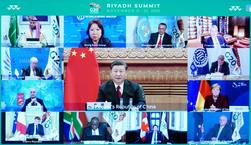 Chinese President Xi Jinping attends Session II of the 15th G20 Leaders' Summit via video link in Beijing, capital of China, Nov 22, 2020. (RAO AIMIN / XINHUA)
Chinese President Xi Jinping attends Session II of the 15th G20 Leaders' Summit via video link in Beijing, capital of China, Nov 22, 2020. (RAO AIMIN / XINHUA)
President Xi Jinping's remarks at the 15th G20 Leaders' Summit have been constructive and of practical significance, delivering a message of hope and offering solutions to the challenges posed by the COVID-19 pandemic, experts have said.
Xi put forward a set of proposals for the G20's role in the post-COVID international order and global governance in his speech, delivering "a message of hope" to the meeting, which was hosted by Saudi Arabia via video link on Saturday and Sunday, said William Jones, Washington bureau chief of the US publication Executive Intelligence Review.
Xi put forward a set of proposals for the G20's role in the post-COVID international order and global governance in his speech, delivering "a message of hope" to the meeting
The Chinese president "pointed to the fact that the onset of COVID-19 had clearly demonstrated the flaws in our international mechanisms", and called for a new governance architecture that provides "a more just and equal world order", all of which "allow the world to better deal with such crises that threaten all of mankind", said Joes.
Abdulaziz Alshaabani, a Saudi journalist and Chinese studies expert, said that as the world faces a number of challenges, with the COVID-19 pandemic among the gravest ones, the responsibilities and actions of the G20 will be even more important.
READ MORE: Full text of Xi's speech at 15th G20 Leaders' Summit
In this context, the speech by the Chinese president is of practical significance and can help guide the international community to make concerted efforts in fighting the pandemic effectively, Alshaabani said.
Sonia Bressler, a French writer and sinologist, said Xi's vision of a community with a shared future for mankind "has never had so much importance, so much real meaning for China and also for the West", since it "offers solutions" to major challenges posed by the health crisis.
"What affects some, affects the other," said Bressler. "We must find a way to work together."
Zhu Ying, director of the Australian Centre for Asian Business, University of South Australia, noted that Xi spoke about China's commitment to help poor nations of the world to gain access to the COVID-19 vaccine as well as aid their economies.
ALSO READ: Full text of Xi's speech at 15th G20 Leaders' Summit
He said it is quite clear that China will lead the global economy out of the recession. China is committed to safeguarding the rules-based multilateral trading system that is transparent, nondiscriminatory, open and inclusive. China supports the World Trade Organization, free trade and is opposed unilateralism and protectionism.
Pierre Defraigne, executive director of the Madariaga-College of Europe Foundation, said the Chinese president's contribution to the G20 is part of a long-term vision of "a fairer, more united, more effective and more sustainable world order".
"I believe that Xi's speech is part of a responsible choice of a great nation, which has shown a lot of credit for its actions in the world," he said.
Continuous efforts
Ngeow Chow Bing, director of the Institute of China Studies at the University of Malaya, said Xi had made the right call at the summit when he said the fight against the pandemic requires more international efforts and cooperation.
"China will play a very important role in any post-pandemic economic recovery," said Ngeow. "It is the right call in terms of China being more open and being the major economic driver."
Noting Xi proposed a global QR code health system to help facilitate cross-border travel amid the pandemic, Ngeow said technical issues including data privacy "should be discussed in good faith among different countries".
"We look forward to China playing this kind of role in helping other countries and working together with many countries in overcoming both the public health issues and economic recovery," said Ngeow.
Vannarith Chheang, president of the Cambodia-based think tank Asian Vision Institute, said it is urgent to restore the global governance system in order to address the increasingly complex and multidimensional global issues. Promoting an inclusive and open multilateral system is the key to strengthening global governance.
Noting Xi underlined the importance of development in tackling poverty, Vannarith Chheang said poverty reduction has been on the global community's top agenda but not much worldwide progress and practical cooperation have been made.
"Inequality remains wide and this has been accentuated by the pandemic," he said, adding that gaps between countries in digital technology, skills, and financial systems are the main issues that need to be addressed.
"The international community needs to double its efforts in narrowing the development gap and promoting inclusive and green recovery to ensure that no one is left behind."
Veronika S. Saraswati, China unit convener at the Center for Strategic and International Studies, a Jakarta-based think tank, said Xi's speech has shown China's commitment for peaceful and joint development of the world.
"The Chinese government does not want hegemony," said Saraswati. "China has been emphasizing cooperative and common development. The world should learn from China."
Xinhua, Yang Han in Hong Kong and Karl Wilson in Sydney contributed to this story.


